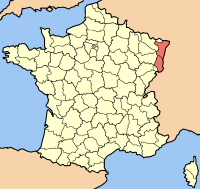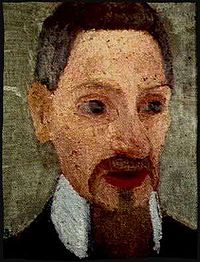
Lost in Translation (poem)
Encyclopedia

Narrative poetry
Narrative poetry is poetry that has a plot. The poems that make up this genre may be short or long, and the story it relates to may be simple or complex. It is usually nondramatic, with objective regular scheme and meter. Narrative poems include epics, ballads, idylls and lays.Some narrative...
by James Merrill
James Merrill
James Ingram Merrill was an American poet whose awards include the Pulitzer Prize for Poetry for Divine Comedies...
(1926–1995), one of the most studied and celebrated of his shorter works. It was originally published in The New Yorker
The New Yorker
The New Yorker is an American magazine of reportage, commentary, criticism, essays, fiction, satire, cartoons and poetry published by Condé Nast...
magazine on April 8, 1974, and published in book form in 1976
1976 in literature
The year 1976 in literature involved some significant events and new books.-Events:* Saul Bellow won both the Nobel Prize for Literature and the Pulitzer Prize for Fiction.-New books:*Kingsley Amis – The Alteration...
in Divine Comedies
Divine Comedies
Divine Comedies is the seventh book of poetry by James Merrill . Published in 1976 , the volume includes "Lost in Translation" and all of The Book of Ephraim...
.
The poem opens with a description of a summer Merrill spent as a child in a great house in The Hamptons, with his governess
Governess
A governess is a girl or woman employed to teach and train children in a private household. In contrast to a nanny or a babysitter, she concentrates on teaching children, not on meeting their physical needs...
, waiting patiently for a rented wooden jigsaw puzzle
Jigsaw puzzle
A jigsaw puzzle is a tiling puzzle that requires the assembly of numerous small, often oddly shaped, interlocking and tessellating pieces.Each piece usually has a small part of a picture on it; when complete, a jigsaw puzzle produces a complete picture...
to arrive in the mail from an Upper East Side
Upper East Side
The Upper East Side is a neighborhood in the borough of Manhattan in New York City, between Central Park and the East River. The Upper East Side lies within an area bounded by 59th Street to 96th Street, and the East River to Fifth Avenue-Central Park...
Manhattan
Manhattan
Manhattan is the oldest and the most densely populated of the five boroughs of New York City. Located primarily on the island of Manhattan at the mouth of the Hudson River, the boundaries of the borough are identical to those of New York County, an original county of the state of New York...
puzzle rental shop.
"Lost in Translation" is Merrill's most anthologized poem, and has been widely praised by literary critics including Harold Bloom
Harold Bloom
Harold Bloom is an American writer and literary critic, and is Sterling Professor of Humanities at Yale University. He is known for his defense of 19th-century Romantic poets, his unique and controversial theories of poetic influence, and his prodigious literary output, particularly for a literary...
.
Background to the poem
Merrill wrote in his lifetime mainly for a select group of friends, fans, and critics, and expected readers of "Lost in Translation" to have some knowledge of his biography. Born in New York City, Merrill was the son of the founder of the world's largest brokerage firmMerrill Lynch
Merrill Lynch is the wealth management division of Bank of America. With over 15,000 financial advisors and $2.2 trillion in client assets it is the world's largest brokerage. Formerly known as Merrill Lynch & Co., Inc., prior to 2009 the firm was publicly owned and traded on the New York...
. He enjoyed a privileged upbringing in economic and cultural terms, although his intelligence and exceptional financial circumstances often made him feel lonely as a child. Merrill was the only son of Charles E. Merrill
Charles E. Merrill
Charles Edward Merrill was an American philanthropist, stockbroker and co-founder, with Edmund C. Lynch of Merrill Lynch & Company .-Early years:...
and Hellen Ingram. (Merrill had two older half siblings from his father's first marriage.)
Given that his parents were often preoccupied, his father with business
Business
A business is an organization engaged in the trade of goods, services, or both to consumers. Businesses are predominant in capitalist economies, where most of them are privately owned and administered to earn profit to increase the wealth of their owners. Businesses may also be not-for-profit...
, his mother with social obligations
Socialite
A socialite is a person who participates in social activities and spends a significant amount of time entertaining and being entertained at fashionable upper-class events....
, Merrill developed a number of close relationships with household staff. "Lost in Translation" describes a profound childhood bond with the woman who taught him French
French language
French is a Romance language spoken as a first language in France, the Romandy region in Switzerland, Wallonia and Brussels in Belgium, Monaco, the regions of Quebec and Acadia in Canada, and by various communities elsewhere. Second-language speakers of French are distributed throughout many parts...
and German
German language
German is a West Germanic language, related to and classified alongside English and Dutch. With an estimated 90 – 98 million native speakers, German is one of the world's major languages and is the most widely-spoken first language in the European Union....
. Merrill's parents would divorce in 1939, when Merrill was thirteen years old, in a scandal that was front page news on the New York Times.
Technical description
Not only is "Lost in Translation" a poem about a child putting together a jigsaw puzzle, it is an interpretive puzzle, designed to engage a reader's interest in solving mysteries at various narrative levels.The poem is dedicated to Merrill's friend, the distinguished poet, critic, and translator Richard Howard
Richard Howard
Richard Howard is an American poet, literary critic, essayist, teacher, and translator. He was born in Cleveland, Ohio and is a graduate of Columbia University, where he studied under Mark Van Doren, and where he now teaches...
. It consists of 215 lines with an additional four line epigraph
Epigraph (literature)
In literature, an epigraph is a phrase, quotation, or poem that is set at the beginning of a document or component. The epigraph may serve as a preface, as a summary, as a counter-example, or to link the work to a wider literary canon, either to invite comparison or to enlist a conventional...
. The poem is mainly in unrhymed pentameter
Pentameter
Pentameter may refer to:*the iambic pentameter of the modern period*the dactylic pentameter of antiquity...
but includes a section in Rubaiyat
Rubaiyat
"Rubāʿī" is Arabic for "quatrain", and is used to describe a Persian quatrain, or its derivative form in English and other languages. The plural form of the word, rubāʿiyāt ,often anglicised rubaiyat , is used to describe a collection of such quatrains.There are a number of possible rhyme schemes...
quatrain
Quatrain
A quatrain is a stanza, or a complete poem, consisting of four lines of verse. Existing in various forms, the quatrain appears in poems from the poetic traditions of various ancient civilizations including Ancient Greece, Ancient Rome, and China; and, continues into the 21st century, where it is...
stanza
Stanza
In poetry, a stanza is a unit within a larger poem. In modern poetry, the term is often equivalent with strophe; in popular vocal music, a stanza is typically referred to as a "verse"...
s. "Lost in Translation" may be classified as an autobiographical narrative
Narrative
A narrative is a constructive format that describes a sequence of non-fictional or fictional events. The word derives from the Latin verb narrare, "to recount", and is related to the adjective gnarus, "knowing" or "skilled"...
or narrative poem, but is better understood as a series of embedded narratives (stories within a story)
Story within a story
A story within a story, also rendered story-within-a-story, is a literary device in which one narrative is presented during the action of another narrative. Mise en abyme is the French term for a similar literary device...
.
A mysterious epigraph in German
Unusual for Merrill, the poem bears a mysterious four-line epigraph in GermanGerman language
German is a West Germanic language, related to and classified alongside English and Dutch. With an estimated 90 – 98 million native speakers, German is one of the world's major languages and is the most widely-spoken first language in the European Union....
, which is printed without translation
Translation
Translation is the communication of the meaning of a source-language text by means of an equivalent target-language text. Whereas interpreting undoubtedly antedates writing, translation began only after the appearance of written literature; there exist partial translations of the Sumerian Epic of...
or attribution
Attribution
Attribution may refer to:Something, such as a quality or characteristic, that is related to a particular possessor; an attribute.*Attribution , concept in copyright law requiring an author to be credited...
:
- Diese Tage, die leer dir scheinen
- und wertlos für das All,
- haben Wurzeln zwischen den Steinen
- und trinken dort überall.
In James Merrill
James Merrill
James Ingram Merrill was an American poet whose awards include the Pulitzer Prize for Poetry for Divine Comedies...
's own English version of this epigraph (published in 1985 in Late Settings
Late Settings
Late Settings is a 1985 collection of poetry by James Merrill .His first book since The Changing Light at Sandover in 1982, Late Settings marked a return to the style, subject matter, and form that had characterized Merrill's poetry from 1951 to 1976....
), these four lines are translated into English as follows:
- These days which, like yourself,
- Seem empty and effaced
- Have avid roots that delve
- To work deep in the waste.
The puzzle is "no puzzle"
- A card table in the library stands ready
- To receive the puzzle which keeps never coming.
- Daylight shines in or lamplight down
- Upon the tense oasis of green felt.
- Full of unfulfillment, life goes on,
- Mirage arisen from time's trickling sands
- Or fallen piecemeal into place:
- German lesson, picnic, see-saw, walk
- With the collie who "did everything but talk" —
- Sour windfalls of the orchard back of us.
- A summer without parents is the puzzle,
- Or should be. But the boy, day after day,
- Writes in his Line-a-Day No puzzle.
- Out of the blue, as promised, of a New York
- Puzzle-rental shop the puzzle comes —
- A superior one, containing a thousand hand-sawn,
- Sandal-scented pieces. Many take
- shapes known already — the craftsman's repertoire
- nice in its limitation — from other puzzles:
- Witch on broomstick, ostrich, hourglass,
- Even (not surely just in retrospect)
- An inchling, innocently-branching palm.
Mademoiselle

Governess
A governess is a girl or woman employed to teach and train children in a private household. In contrast to a nanny or a babysitter, she concentrates on teaching children, not on meeting their physical needs...
, whom he repeatedly refers to as Mademoiselle. Part mother, part teacher, part nanny
Nanny
A nanny, childminder or child care provider, is an individual who provides care for one or more children in a family as a service...
, part servant, she is described by Merrill as "stout, plain, carrot-haired, devout."
At one point in the poem, Mademoiselle speaks the same phrase in French and in German. In addition to playing with the boy's marionette
Marionette
A marionette is a puppet controlled from above using wires or strings depending on regional variations. A marionette's puppeteer is called a manipulator. Marionettes are operated with the puppeteer hidden or revealed to an audience by using a vertical or horizontal control bar in different forms...
s and doing jigsaw puzzles with him, Mademoiselle is teaching the young James Merrill languages which would be critical to making him the sophisticated and urbane lyric poet of later life. By giving name, in several languages, to objects and tasks around the home, Mademoiselle helps the young James Merrill come to understand a doubleness about language itself, that objects and activities can have different names and connotations across languages.
From the child's point of view, the "puzzle" goes well beyond what is taking place on the card table. Merrill is puzzling through the mystery of his existence, puzzling through the mystery of what the world is, what objects are, what people do in life. An unspoken puzzle is solved when the young Merrill determines what his relationship to Mademoiselle is, given the frequent absence of his own mother. Mademoiselle knows "her place", he writes, indicating his first consciousness of his own class privilege, as well as (perhaps) the limits placed on Mademoiselle's maternal role.
Yet other puzzles are not solved until later in life. At one point the narrator's voice modulates into that of an adult. We find out that Mademoiselle hid her true origins from the boy (and from his family) because of the political tensions leading up to 1939 and to the outbreak of World War II. Mademoiselle claimed to be French and hid her German or Alsatian
Alsace
Alsace is the fifth-smallest of the 27 regions of France in land area , and the smallest in metropolitan France. It is also the seventh-most densely populated region in France and third most densely populated region in metropolitan France, with ca. 220 inhabitants per km²...
birth. She presumably gained a French family name
Family name
A family name is a type of surname and part of a person's name indicating the family to which the person belongs. The use of family names is widespread in cultures around the world...
through marriage to a soldier who died in the Battle of Verdun
Battle of Verdun
The Battle of Verdun was one of the major battles during the First World War on the Western Front. It was fought between the German and French armies, from 21 February – 18 December 1916, on hilly terrain north of the city of Verdun-sur-Meuse in north-eastern France...
in World War I (1914–1918). Mademoiselle could let no one know she was German for fear of losing her job and her employers' trust. This explains the fact that Merrill's own French, learned in imitation of his governess, was always spoken with a slight German accent. The boy finds out the full truth only as an adult, after a chance conversation with Mademoiselle's grown nephew, a United Nations
United Nations
The United Nations is an international organization whose stated aims are facilitating cooperation in international law, international security, economic development, social progress, human rights, and achievement of world peace...
interpreter
Interpreting
Language interpretation is the facilitating of oral or sign-language communication, either simultaneously or consecutively, between users of different languages...
, who tells him the story of the governess's true origins.
The poem includes several other secondary narratives, including a section in which the puzzle itself is put together. Inspired by Omar Khayyám
Omar Khayyám
Omar Khayyám was aPersian polymath: philosopher, mathematician, astronomer and poet. He also wrote treatises on mechanics, geography, mineralogy, music, climatology and theology....
's Rubaiyat
Rubaiyat of Omar Khayyam
The Rubáiyát of Omar Khayyám is the title that Edward FitzGerald gave to his translation of a selection of poems, originally written in Persian and of which there are about a thousand, attributed to Omar Khayyám , a Persian poet, mathematician and astronomer...
quatrains, Merrill describes an imaginary harem
Harem
Harem refers to the sphere of women in what is usually a polygynous household and their enclosed quarters which are forbidden to men...
-like 19th century Orientalist
Orientalism
Orientalism is a term used for the imitation or depiction of aspects of Eastern cultures in the West by writers, designers and artists, as well as having other meanings...
painting, by an alleged follower of Jean-Léon Gérôme
Jean-Léon Gérôme
Jean-Léon Gérôme was a French painter and sculptor in the style now known as Academicism. The range of his oeuvre included historical painting, Greek mythology, Orientalism, portraits and other subjects, bringing the Academic painting tradition to an artistic climax.-Life:Jean-Léon Gérôme was born...
, that begins to appear as the puzzle pieces are put together. When the puzzle is nearly done, the piece that was missing the whole time is found under the table at the boy's feet. The missing piece is, in fact, an image of the boy's feet. When it is put in place, the portrait of the little boy in the puzzle is finally complete.
A puzzle within a puzzle...

Séance
A séance is an attempt to communicate with spirits. The word "séance" comes from the French word for "seat," "session" or "sitting," from the Old French "seoir," "to sit." In French, the word's meaning is quite general: one may, for example, speak of "une séance de cinéma"...
, describes a medium who is able to divine that a piece of a wooden jigsaw puzzle has been concealed inside a box.
To understand "Lost in Translation", the reader must work out and solve a puzzle
Puzzle
A puzzle is a problem or enigma that tests the ingenuity of the solver. In a basic puzzle, one is intended to put together pieces in a logical way in order to come up with the desired solution...
in the narrative text, revealed by a confession Merrill the adult makes at the end of the poem. The little boy has apparently kept a piece of the jigsaw puzzle, in the shape of a palm tree, throughout his life. This fact has jogged the memory in Merrill of a poem called "Palme" by the French Symbolist poet Paul Valéry
Paul Valéry
Ambroise-Paul-Toussaint-Jules Valéry was a French poet, essayist, and philosopher. His interests were sufficiently broad that he can be classified as a polymath...
(1871–1945), and that memory in turn has reminded Merrill of a German translation he has once seen of that same poem by poet Rainer Maria Rilke
Rainer Maria Rilke
René Karl Wilhelm Johann Josef Maria Rilke , better known as Rainer Maria Rilke, was a Bohemian–Austrian poet. He is considered one of the most significant poets in the German language...
(1875–1926).
The poet knows that he has seen and read the Rilke translation before, because he can picture the words on the page. "The owlet umlaut peeps and hoots/ Above the open vowel", Merrill writes, in some of the poem's most quoted lines. Yet despite remembering the experience of reading the Rilke translation, he cannot locate a copy in Athens, Greece (where Merrill and his partner David Jackson
David Noyes Jackson
David Noyes Jackson was the life partner of poet James Merrill . A writer and artist, Jackson is remembered today primarily for his literary collaboration with Merrill....
were living six months of the year), and begins to doubt whether it exists except in his imagination. The poem "Lost in Translation" assumes the form of a letter to Richard Howard seeking an actual copy of that translation.
...Solved!

Late Settings
Late Settings is a 1985 collection of poetry by James Merrill .His first book since The Changing Light at Sandover in 1982, Late Settings marked a return to the style, subject matter, and form that had characterized Merrill's poetry from 1951 to 1976....
, 1985.)
The original in French:
- Ces jours qui te semblent vides
- Et perdus pour l'univers
- Ont des racines avides
- Qui travaillent les déserts.
from Paul Valéry, Charmes (1922) Palme classical dizain 7th Stanza
The solution to the puzzle of the poem is hidden in plain sight all along. "Nothing's lost", Merrill suggests, when it comes to translating experience or memory, at least according to the way Merrill understands our human experience. The poem's coda salutes the power of the transformative imagination to recover meaning in the world from all we see and remember. Its language and phrasing offer a veiled tribute by Merrill to the poet he most admired from his father's generation, Wallace Stevens
Wallace Stevens
Wallace Stevens was an American Modernist poet. He was born in Reading, Pennsylvania, educated at Harvard and then New York Law School, and spent most of his life working as a lawyer for the Hartford insurance company in Connecticut.His best-known poems include "Anecdote of the Jar",...
(author of "The Palm at the End of the Mind"):
- But nothing's lost. Or else: all is translation
- And every bit of us is lost in it...
- And in that loss a self-effacing tree,
- Color of context, imperceptibly
- Rustling with its angel, turns the waste
- To shade and fiber, milk and memory.

